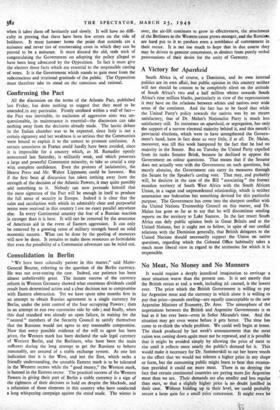A Victory for Apartheid South Africa is, of course, a
Dominion, and its own internal politics are its own affair, but public opinion in this country neither will nor should be content to be completely silent on the attitude of South Africa's two and a half million whites towards South Africa's nine million blacks, particularly in view of the repercussions it may have on the relations between whites and natives over wide areas of the continent. And the fact has to be faced that while the United Party's policy towards the natives was by no means satisfactory, that of Dr. Malan's Nationalist Party is much less satisfactory still. Its insistence on apartheid, or segregation, has only the support of a narrow electoral majority behind it, and this month's provincial elections, which were to have strengthened the Govern- ment's hand, have in fact done so very little, if at all. Dr. Malan, moreover, was till this week hampered by the fact that he had no majority in the Senate. But on Tuesday the United Party expelled from its ranks Senator Brink, because he declined to oppose the Government on colour questions. That means that if the Senator does not actually vote with the Government on such questions, but merely abstains, the Government can carry its measures through the Senate by the Speaker's casting vote. That may, and probably will, be decisive in the case of the Bill " associating" the former mandate territory of South West Africa with the South African Union, in a vague and unprecedented relationship, which is neither annexation nor federation but something devised for this particular purpose. The Government has come into the sharpest conflict with the United Nations Trusteeship Council on this matter, and Dr. Malan has gone so far as to say that he will discontinue sending reports on the territory to Lake Success. In the last resort South Africa can defy public opinion both in Great Britain and at the United Nations, but it ought not to follow, in spite of our cordial relations with the Dominion generally, that British delegates to the United Nations should necessarily support the Union on native questions, regarding which the Colonial Office habitually takes a much more liberal view in regard to the territories for which it is responsible.














































 Previous page
Previous page